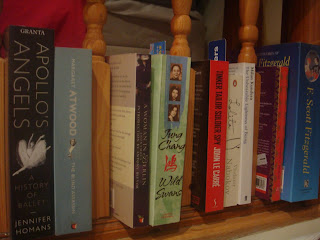After reading books about ballet and cinema, it seems only plausible for me to continue reading a subject of my interest - music. I found this book through New York Times Notable Books of the Year list. The book has apparently achieved critical acclaim worldwide since its publication. I find this book one of the best non-fictions (not limited to music) I've read my entire life - the contents are personal yet insightful. It's about the history of classical music in the twentieth century although it does touches the issues of Jazz and Rock & Roll. Colin Greenwood of Radiohead praised the book for providing an accessible way to learn about a subject often closed off as too difficult. This is very true - when I was a music student, I often found classical music of 20th century hard to listen to and understand. All my life, my most favourite period of classical music is the Romantic period, often characterised by emotional type of music performed in a dramatic manner. This explains my long term admiration for Tchaikovsky's works, particularly his ballets. Do you see the connection? I love ballets, so naturally I would research about other composers who did works for ballets. Yes, that's exactly how I discovered Stravinsky, who was arguably the most important figure of 20th century classical music. His works for Diaghilev's Ballet Russes are astonishing, especially The Rite of Spring. Until now, the complexity and anti-Romantic patterns of the scores are unforgettable.
This book basically gives a really good description of several prominent European classical music composers over the period, namely Mahler, Strauss, Schoenberg, Stravinsky, Debussy, Sibelius, Prokofiev, Shostakovich, before moving to American ones, including Gershwin, Bernstein, and so on. I learnt a lot about the general public's reactions when certain unconventional works by these composers were premiered. The influence of Jazz on music of this period was unavoidable. Rhapsody in Blue by Gershwin is an example of a crossover of Jazz and Classical music. Duke Ellington's Creole Rhapsody (link below) is another. I got pretty nostalgic about Nodame Cantabile while listening to Rhapsody in Blue.
I had great fun exploring different works mentioned in the books. For those I've listened to before, I listened again for further clarity and for those I've never come across before, I managed to learn new music. I have to admit I was biased towards the first and second parts of the book while reading because those are my main interest. Nevertheless, I'm sure I'll re-read this book again in the future when I wish to understand more contemporary composers including Glass, Adams and so on. I also learnt that Korngold was the prince of Hollywood film music composer although Herrmann made the most original composition (I mentioned him previously). Even Schoenberg and Stravinsky wanted to compose music for films in Hollywood, they were big fans of cinemas too! Of course, not being a serious student of music, I found some parts difficult to absorb, but the gripping presentation of the subject did not deter my enthusiasm to read. I thoroughly enjoyed my reading period, which only took about 2 days for a 624-page book. I definitely recommend this book to anyone who's interested in learning more about the more recent period of classical music. Classical music isn't always about Bach, Mozard and Beethoven!





